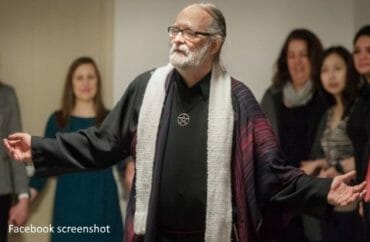
Meet Samuel Wagar.
He isn’t just a Wiccan chaplain serving at the University of Alberta. This year he was elected by his fellow chaplains to chair their Interfaith Chaplains’ Association and was appointed by them to administer multi-faith prayer and meditation spaces on campus.
Wagar is accepted, embraced and celebrated at this Canadian campus. He said it isn’t a problem.
“If a Christian, Muslim, or Jewish person comes to me, I will listen and help them on a human level,” he told The College Fix in an email interview. “People can unburden themselves and have a confidential conversation about meaning with me, or about issues in their lives in general.”
Wagar, who has been a Wiccan priest for 32 years, said if students prefer a chaplain from a specific religion, he refers them. He said he’s not in the business of proselytizing.
“It would be extremely unethical for me to take advantage of a person who came to me for counseling or in crisis and try to convert them to my religion,” he said. “Not only is it unethical and personally distasteful, it is contrary to the spirit of our interfaith chaplaincy and to the chaplains’ association’s agreement with the university.”
“Wicca also is not a proselytizing religion,” he added. “We are polytheist and tolerant and believe that the divine reveals itself to different people in different ways so that what works for me may not suit you and that is a good thing.”
MORE: More students, young Americans turn to paganism
Wagar’s position recently made headlines in a few Canadian news outlets. For example, a Nov. 26 feature in Toronto’s Metro News reported that Wagar began chaplain duties at the University of Alberta three years ago and is the first Wiccan to chair its Interfaith Chaplains’ Association.
It added that Wagar has set aside Wednesday afternoons to offer students free tarot card readings at the Student Union Building.
And a Dec. 4 feature in CBC News on Wagar pointed out that the University of Alberta is one of three universities in Canada that has a Wiccan chaplain.
Wagar, in his email interview with The College Fix, said Canada differs from the United States when it comes to religious pluralism.
“Canada is explicitly multi-cultural and multi-religious in ways that may seem unusual to your American readers,” he said. “There is no Christian political party that has any sizable following here, and when politicians pander to anti-Muslim religious bigotry they get defeated (as former Conservative Prime Minister Harper discovered).”
According to the University of Alberta’s website, “Chaplains serve the university from the understanding that life, including academic life, is a spiritual journey.”
Wagar said he counsels students of differing religious backgrounds and acts as an impartial listening ear, sometimes directing students to health services and other supports as needed.
Like all chaplains, Wagar said he aims to “provide counseling and support to students struggling with the stresses and difficulties of university life, and the particular issues of being young adults, lonely and away from family and home (particularly true for international students).”
The chaplains association acts predominantly as a supplemental health service in that regard and also stresses the importance of tolerance and acceptance.
“It charms me when I am in my office there and the evangelical Christian group is having a Bible study in one of the offices, the Sunni Muslim students are praying in the large prayer space, the Presbyterian and Reform weekly student service is happening in a smaller meeting room, all at once,” Wagar told The Fix.
As for Wagar, he said he is a doctoral student in theology at St. Stephen’s College, a multi-faith theological school, and his chaplaincy is a voluntary commitment which he’s taken on in addition to his studies. He also teaches a course in Wiccan theology jointly through St. Stephen’s College and the University of Alberta.
During his three-plus decades as a Wiccan priest, he said he has established religious retreats in two provinces, co-founded a national church and one of its provincial branches, and written four books, including “Creating Lore, Writing Ritual” and “The Uses of Ecstasy: Ritual and Practical Mysticism in Wicca.”
“Through the efforts of many Wiccans over many years,” he said, “we have established ourselves as another small religious movement, part of the Canadian religious landscape.”
MORE: Catholic university launches pagan student club
Like The College Fix on Facebook / Follow us on Twitter






Please join the conversation about our stories on Facebook, Twitter, Instagram, Reddit, MeWe, Rumble, Gab, Minds and Gettr.